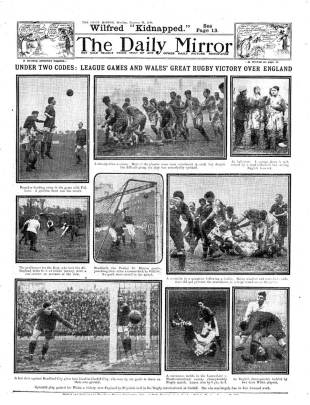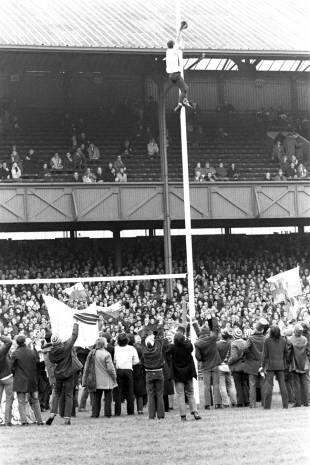|
Scrum Sevens
Bouncing back from a Welsh thrashing
Tom Hamilton
March 7, 2014

George Davies slots a conversion for Wales against England in 1905 © PA Photos
Enlarge
Last year saw Wales record their biggest ever win over England as they unceremoniously hammered Stuart Lancaster's side 30-3 in Cardiff. It was not the first occasion they have been on the wrong end of a beating from Wales and Scrum Sevens looks back at some big Welsh wins over England and whether they bounced back the following year. 1905-1906 1905 was a good year for Welsh rugby. Not only did they ease past England with a convincing 25-0 win, a match which saw the Welsh receive a record total on the gate of £2,131, they also went on to win the Home Nations trophy and in December, they beat New Zealand in what was their first ever meeting. While Wales were experiencing a year of rugby prosperity, England were in the mire. They failed to win a single game in 1905 and when they met Wales the following year in Richmond, it was a similar story with England losing 16-3. Just John Raphael and Vincent Cartwright remained in the England team who floundered the previous year and while they managed to get a try through debutant Arthur Hudson, Wales had little difficulty getting the win as they crossed for four tries. 1922-23

The Daily Mirror provides its take on the 1922 hammering
© Scrum.com
Enlarge
The 1922 crop of Welsh players went one better than the 1905 group as they scored eight tries against England in a 28-6 thrashing in front of 35,000 people in Cardiff. It was a humbling start to the 1922 championship for England as one year pervious, they emerged from the Five Nations with a Grand Slam to their name. A Daily Mirror report at the time said "never in the history of rugby football has form been so completely falsified". It was a win built on the power of Wales' forwards and according to the same report, it was "as fine a pack as has ever worn the Prince of Wales' feathers". A year later, England were back at their Twickenham base and unlike the 1906 crop, they managed to regain some face as they beat Wales 7-3 with Leo Price's try and Alastair Smallwood's drop-goal cancelling out Gwilym Michael's effort. England went on to secure the Grand Slam and repeated the feat in 1924. 1951-52 The first few years following World War II were not a good time for English rugby. It was a period of Celtic dominance in the Five Nations as Ireland and Wales exchanged titles until 1953. In 1951, Wales beat an England team, featuring 10 debutants, 23-5 in front of 50,000 at St Helen's in Swansea. Wales scored five tries in total, with the great Jack Matthews grabbing a brace. "At 23-5 the score represented all the differences between a first-class team and one that at best was in the making", a Times report read. The following year, a settled England side put in a more concerted effort but they still lost out 8-6 to Wales at Twickenham. Despite the Wales team having an injured Lewis Jones playing the whole match, the power of the pack saw them home with Ken Jones grabbing two scores alongside Malcolm Thomas' conversion. 1969-70 The 1969 Five Nations saw Wales hand debuts to two players who would form the crux of their great 1970s side. Mervyn Davies and JPR Williams ran out in their first Test against Scotland on February 1, 1969, and three games later they faced England in Cardiff. England had no answer to Maurice Richards on the wing as he ended the game with four tries as Wales cantered to a 30-9 victory. Wales would go on to win that year's tournament and there would be plenty more silverware to come over the next decade.

A Wales supporter climbs a goal post at Twickenham after their 1970 triumph
© PA Photos
Enlarge
The following year saw more of the same as Wales stormed Twickenham to win 17-13. England led 13-3 at half-time but Wales left it late to steal the win with Ray 'Chico' Hopkins scoring what proved to the try that teed up the game-clinching conversion from JPR. A Daily Express report at the time heralded the game, saying: "If I never see a more exciting international than Wales' 'schoolboy magazine' victory over England in injury time, rugby football won't owe me anything." 1973-74 The 1973 championship ended up being shared five-ways with each side winning two and losing two. But Wales started the campaign in the best form as they beat England 25-9 in Cardiff. It was their fifth win on the trot against England and it was an era of dominance for those wearing the red jersey. But a year later, England faced a Wales team without Derek Quinnell, John Taylor and Arthur Lewis and managed to get some more joy. Tries from David Duckham and Andy Ripley, alongside a conversion and two penalties from Alan Old, cancelled out Mervyn Davies' try and the boot of Phil Bennett as England won 16-12. It could have been a different story had the Irish referee given John J. Williams' late score then Wales would have drawn the game and perhaps won with the conversion. 1979-80 The 1979 Five Nations marked an end of an era of Welsh dominance. It was to be their final championship for 15 years and it was the last for the great JJ Williams and Derek Quinnell. They ended on a high as they hammered England 27-3 in Cardiff. A year later and like 1974, England regained the bragging rights with a 9-8 win at Twickenham. Dusty Hare's three penalties cancelled out Elgan Rees and Jeff Squire's try as Paul Ringer saw red for Wales and England went on to secure the Grand Slam. 1987-88 While the 1980s was a tough time for Welsh rugby, they still managed to stick a 16-3 win on England in the quarter-finals 1987 World Cup, a which brought to an end Martin Green's time in charge of the side. The Daily Express was less than impressed, reporting: "England went out of the World Cup without even a whimper in Brisbane yesterday. They froze at the sight of a red shirt and Wales did not need to lift their game to win. It was a damning indictment of British rugby. The locals among the 12,000 crowd either dozed off through boredom or jeered in derision." Wales went on to be thrashed by eventual winners New Zealand 49-6 in the semi-finals. Come the following year's Five Nations Wales inflicted more pain on England with a 11-3 triumph at Twickenham. It was a young England side with Will Carling, Jeff Probyn and Mickey Skinner making their debuts the game previous against France. © ESPN Sports Media Ltd Tom Hamilton is the Assistant Editor of ESPNscrum.
|
Live Sports
Communication error please reload the page.
-
Football
-
Cricket
-
Rugby
-
- Days
- Hrs
- Mins
- Secs
F1 - Abu Dhabi GP
Abu Dhabi Grand Prix December 11-131. Max Verstappen ()
2. Valtteri Bottas (Mercedes)
3. Lewis Hamilton (Mercedes)
4. Alexander Albon ()
5. Lando Norris ()
6. Carlos Sainz Jr ()
-
ESPNOtherLive >>
Snooker - China Open
Tennis - Miami Open

